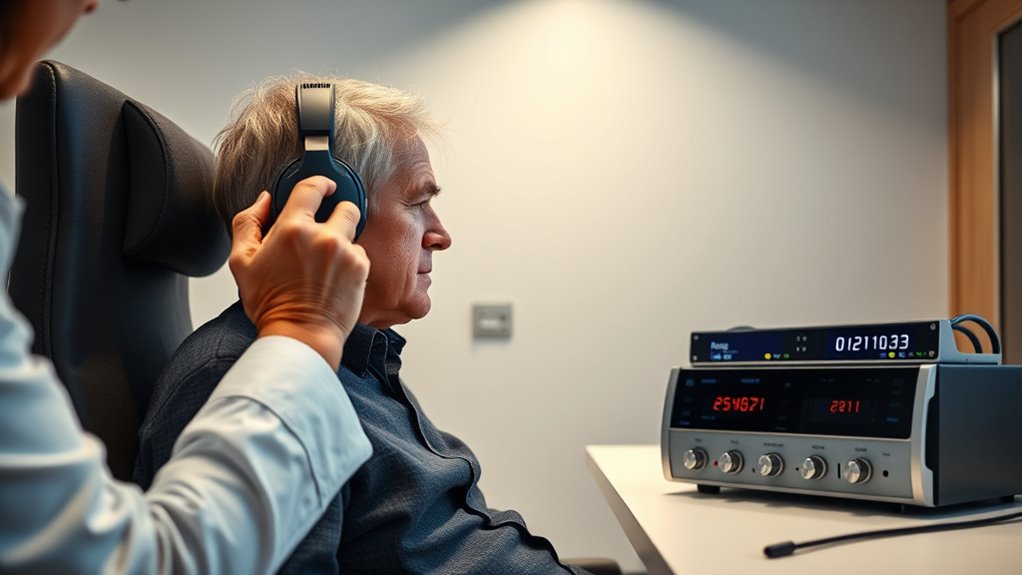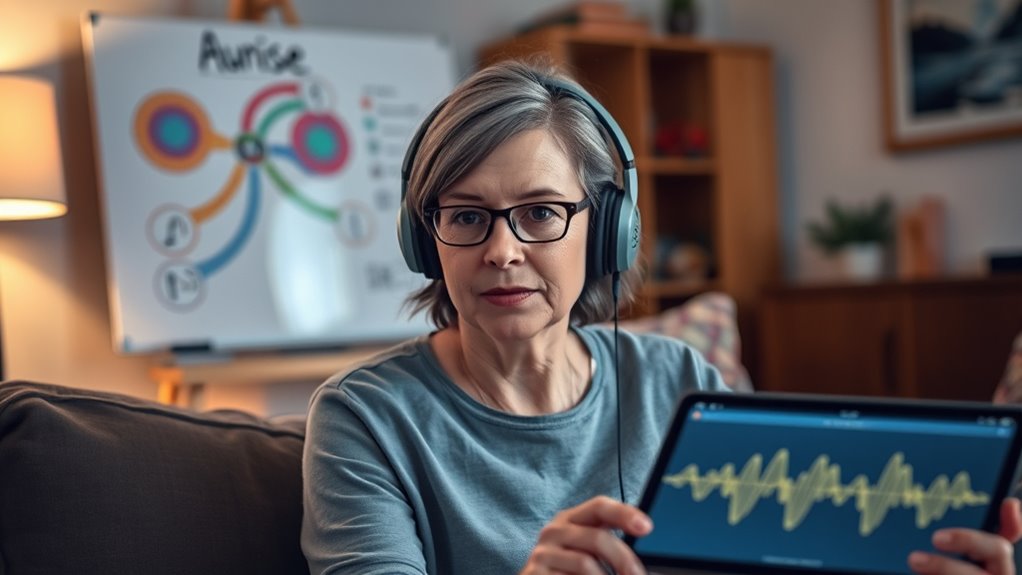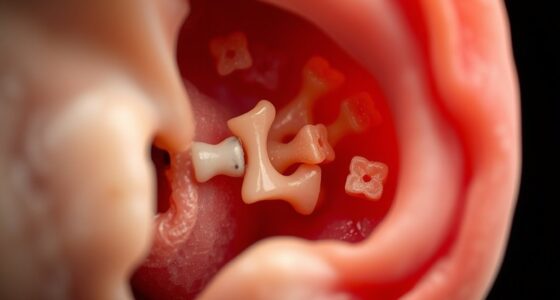Auditory Processing Disorder (APD) in adults affects how your brain interprets sounds, making it hard to understand speech in noisy places or follow complex conversations. You might notice missing words, feeling mentally exhausted after listening, or struggling with similar sounds. Causes include head injuries, exposure to loud noise, or neurological conditions. If these issues sound familiar, exploring more can help you understand how to manage and improve your communication abilities.
Key Takeaways
- APD in adults involves difficulty processing sounds and speech, especially in noisy environments, despite normal hearing ability.
- Symptoms include trouble understanding conversations, asking for repetitions, and mental fatigue after listening.
- Causes include brain injuries, chronic noise exposure, neurological conditions, stress, and developmental factors.
- Diagnosis requires specialized assessments by audiologists, focusing on sound differentiation and auditory processing skills.
- Management strategies involve reducing background noise, using assistive devices, active listening, and auditory training exercises.
Understanding Auditory Processing Disorder in Adults

Auditory Processing Disorder (APD) in adults can often go unnoticed because its symptoms are subtle and easily confused with other issues like hearing loss or attention problems. You might struggle to distinguish speech in noisy environments or find it hard to follow conversations, especially when multiple people speak at once. APD isn’t caused by problems with your ears but by how your brain processes sounds. It can affect your ability to understand spoken language, especially when the signal is unclear or background noise is present. Many adults live with these challenges for years before recognizing there’s an underlying issue. Understanding APD involves knowing that it’s a neurological condition impacting the way your brain interprets sounds, not a hearing loss. As technological advancements, such as AI in Education, continue to evolve, awareness and support strategies for conditions like APD are becoming increasingly important.
Recognizing the Signs and Symptoms of APD in Adulthood

Many adults with APD may not realize they have a problem because the symptoms can be subtle and easily mistaken for other issues. You might notice difficulty understanding speech in noisy environments or missing parts of conversations. You may find it hard to follow rapid speech or distinguish similar sounds. Sometimes, you could feel mentally fatigued after listening or struggle with localizing where sounds come from. You might also experience:
- Trouble understanding speech despite normal hearing
- Frequently asking others to repeat themselves
- Difficulty following complex instructions
- Sensitivity to background noise
- Feeling frustrated or overwhelmed during conversations
Recognizing these signs helps you seek proper assessment and support to manage APD effectively. Additionally, proper support systems can significantly improve communication skills and quality of life for adults with APD.
Causes and Risk Factors Contributing to Adult APD

While the exact causes of adult APD remain unclear, several risk factors can increase your likelihood of developing the disorder. Head injuries, particularly those involving the brain, can disrupt auditory pathways and processing centers. Chronic exposure to loud noise over time may damage auditory nerves or brain structures involved in processing sound. Neurological conditions like multiple sclerosis or stroke can impair neural pathways necessary for auditory comprehension. Additionally, psychological factors such as high stress levels or trauma can influence auditory processing abilities. Certain developmental factors, including childhood hearing issues or learning disabilities, might also contribute to adult APD. Age-related changes in brain function and auditory system decline can further increase vulnerability. Recognizing these risk factors helps you understand potential causes and emphasizes the importance of early intervention. Moreover, high-quality audio equipment can sometimes compensate for processing difficulties by enhancing sound clarity.
Diagnostic Procedures and Professional Evaluation

Diagnosing adult APD involves a thorough evaluation conducted by trained audiologists or other healthcare professionals. You’ll undergo a series of specialized tests designed to assess how your brain processes sounds. These tests help differentiate APD from other hearing or cognitive issues. Expect to participate in assessments that measure your ability to understand speech in noisy environments, differentiate sounds, and process rapid auditory information. The evaluation may include a detailed case history and questionnaires to understand your daily challenges. Self Watering Plant Pots are an example of innovative tools that utilize specialized systems to maintain optimal conditions with minimal intervention. These procedures work together to provide a comprehensive picture of your auditory processing capabilities.
Strategies and Treatments to Manage APD in Daily Life

Managing APD in daily life involves implementing practical strategies that enhance your ability to process auditory information. To start, minimize background noise whenever possible, such as choosing quiet environments for conversations. Use assistive listening devices like FM systems or hearing aids if recommended by your audiologist. Practice active listening by focusing intently on speakers and asking for clarification when needed. Break complex conversations into smaller parts to improve understanding. Keep notes or use visual cues to reinforce what you hear. Building awareness of your strengths and challenges helps you develop personalized coping techniques. Regular auditory training exercises can also improve your processing skills over time. Additionally, integrating AI-powered tools designed to support auditory processing can further enhance your communication capabilities. Ultimately, combining these strategies with professional guidance can considerably improve your communication and daily functioning.
Frequently Asked Questions
Can APD in Adults Improve Over Time Without Treatment?
You might wonder if APD in adults can get better without treatment. While some individuals notice slight improvements over time, most experience persistent challenges. Without intervention, your ability to process sounds and understand speech in noisy environments likely won’t improve markedly. Seeking professional help, like therapy or coping strategies, can make a real difference in managing symptoms and enhancing your communication skills, leading to better quality of life.
Are There Any Medications That Effectively Treat Adult APD?
Imagine trying to tune an old radio to clear static—that’s what searching for effective medication for adult APD feels like. Currently, no medications specifically treat APD, but some people find relief through therapies that improve auditory skills. While medications can help manage symptoms of related issues like anxiety or attention, they don’t target APD directly. You should work with a specialist to develop a tailored approach.
How Does APD Affect an Adult’S Work Performance?
You might find that APD impacts your work by making it difficult to follow conversations, especially in noisy environments. You could struggle to distinguish similar sounds or understand fast-paced speech, leading to misunderstandings or missed information. This can cause frustration, reduce your productivity, and increase your stress levels. You may need to ask colleagues to repeat themselves or work harder to focus, which can affect your overall job performance.
Is APD More Common in Certain Professions or Lifestyles?
Think of your ears as a busy airport control tower, trying to sort through multiple conversations at once. Certain professions, like teachers or customer service reps, demand constant auditory attention, increasing the likelihood of APD symptoms. While APD isn’t limited to specific jobs, those exposed to noisy environments or complex auditory tasks may notice it more. Recognizing these patterns helps you better understand and manage potential challenges.
Can APD Be Mistaken for Other Mental Health or Neurological Conditions?
You might wonder if your symptoms could be mistaken for other conditions. It’s common for issues like attention deficit disorder, anxiety, or neurological problems to mimic auditory processing difficulties. Because these conditions share symptoms like trouble focusing or processing sounds, a misdiagnosis can happen. To get clarity, consult a healthcare professional who can perform specific tests, differentiate between these conditions, and recommend appropriate treatment options.
Conclusion
Understanding auditory processing disorder in adults reveals a complex challenge—though your ears may seem fine, your brain struggles to interpret sounds. While diagnosis offers clarity, it also uncovers the ongoing effort needed to manage daily communication. Like a delicate balance between frustration and resilience, steering APD requires patience and support. Recognizing this contrast empowers you to seek solutions, transforming obstacles into opportunities for growth and improved connection in your everyday life.









